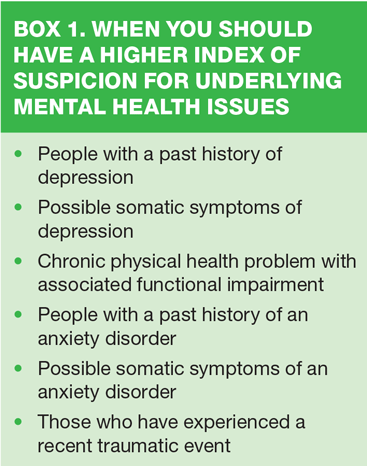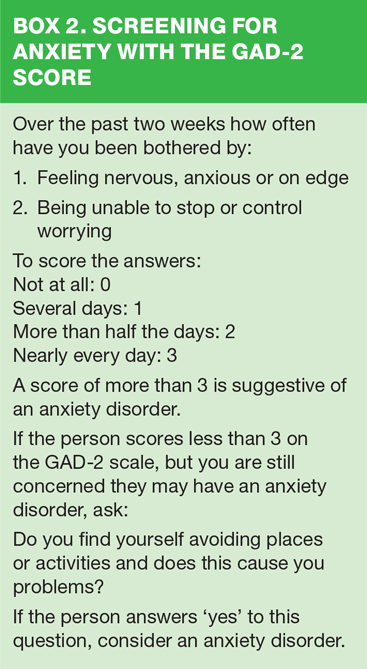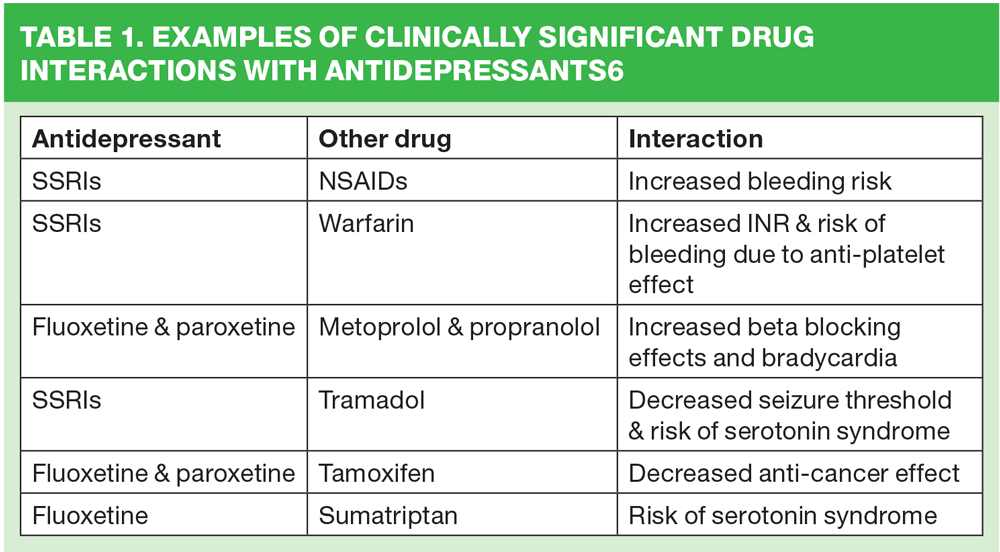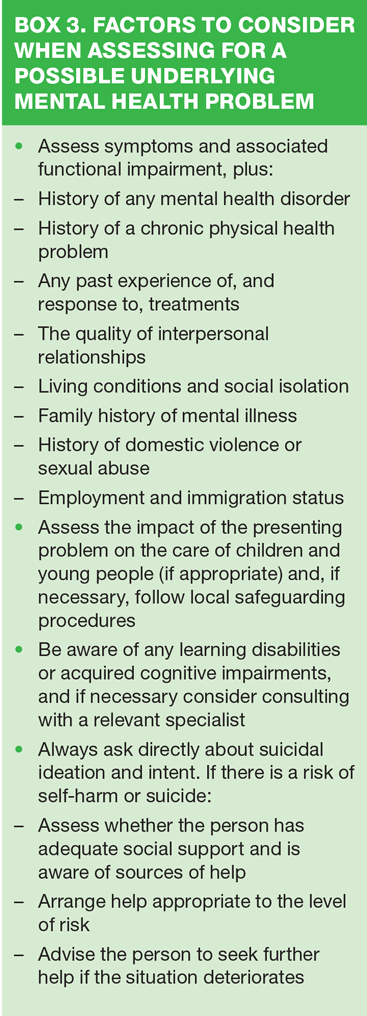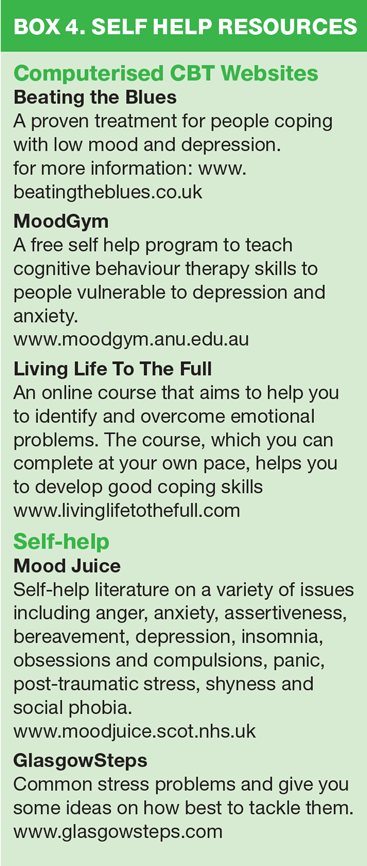
A Practice Nurse guide: Common mental health problems
Dr Mandy Fry, Portfolio GP & Oxford GP School Senior Programme Director
Dr Mandy Fry, Portfolio GP & Oxford GP School Senior Programme Director
(Retainers & GP I&R Scheme)
Mental health problems may impact on your practice more commonly than you might think, so it is important to have a basic understanding of the issues. In the first of an occasional series, we look at common mental health problems in general terms. Future articles will address particular mental health conditions in more detail
At any one time, it is thought that one in six people in the UK struggle with a mental health problem, and that one in four will be unwell over the course of a year.1 Up to one in three GP consultations involve mental health problems in some way.2 So, given this background prevalence, it is not surprising that mental health issues will regularly impact on a practice nurse’s workload as well. This means that even those without specialist training in this area need to have a basic understanding of some of the issues. This introductory article looks about how common mental health issues may impact on your practice, whereas subsequent articles will address particular mental health issues in more detail.
Consider Jane, a 54 year old woman, who comes to see you for her annual diabetes review. You notice that Jane, who is usually very talkative, seems reluctant to talk to you about her family, even though you know that she has recently had a new grandchild.
It is now well recognised that having a chronic physical health condition puts an individual at increased risk of developing a mental health problem,2 particularly depression. So a routine chronic disease management clinic is an ideal opportunity to identify individuals who may be affected and might benefit from further advice and/or treatment. Sometimes also having additional information about the individual, or prior knowledge of their personality can also help to highlight people who may be particularly at risk. In Jane’s case, a new grandchild would be expected to be a source of joy and something that, based on your previous knowledge of her, you would expect her to want to share with you.
So, just as retinopathy screening has become a routine part of diabetes management so should screening for a depressive disorder. There are two simple questions that you can ask:2
During the past month have you often been bothered by
1. Feeling down, depressed or hopeless?
2. Having little interest or pleasure in doing things?
Clearly just dropping these questions into the consultation might not be a helpful approach but you should all be able to introduce them in a sensitive manner. Consider trying to use them for every patient that you see, not just those for whom your index of suspicion has been raised. It is useful to be able to put a timescale on the questions that you ask as this helps to focus the patient’s thoughts and make them think about whether things are different from how they used to be.
You ask Jane the two depression screening questions and she admits that she has noticed that while she would not describe herself as depressed she has found that she is not really enjoying life as much as she used to. She mentions her new grandchild and also a forthcoming holiday that her husband has planned to celebrate their 25th wedding anniversary.
So you have managed to identify that Jane may be suffering from a mental health issue. Clearly the whole issue needs addressing further and there are several options available to you. What you choose to do will depend on a number of factors, such as the time you have available and your competence and confidence in working with mental health issues. You could, if you have the necessary skills, carry out a further assessment of Jane yourself or you could signpost her to her GP or to some self help strategies.3 It is important, however, that Jane does not feel that you are simply ignoring her concerns or forcing her towards seeing someone with whom she does not have an existing rapport.
NICE2 recommends a stepped care approach to dealing with common mental health problems, where you begin with the least intrusive and most effective intervention. However, at the moment you have not got the full picture for Jane for whom, at the very least, you need to undertake an assessment that she is not at risk of self harm or suicide. If you are not confident to do this yourself then you need to refer Jane to someone who is, and ensure that she follows through with the next stage of the assessment process. Disclosing how they are feeling can be a big step for some patients to take so you need to help enable Jane to take this further, which might include strategies such as actually making her an appointment with the GP of her choice rather than simply encouraging her to make one at reception when she leaves
You talk to Jane about the fact that her answers suggest that perhaps she does have a degree of underlying depression and that she might benefit from some help with her mood. You work with Jane to identify which GP she feels most comfortable with and you make her an appointment to see them within the next week. You make a note yourself of when the appointment is so that you can make sure that Jane does actually attend and you can find out what happens. You make a clear entry on the medical record as to why Jane needs the appointment and could even try and catch the GP concerned to give them a handover as well.
As well as individuals with chronic physical health conditions there are others who are at increased risk of having underlying mental health issues (see box 1). It makes sense to familiarise yourself with these groups so that you can have a higher index of suspicion when they consult you for other reasons.
Identifying individuals at risk of mental health issues and assessing the need for further intervention is Step 1 of NICE’s stepped care model for common mental health problems. Every practice nurse ought to be alert to the possibility of an underlying mental health condition as recognition and treatment can have a dramatic effect on the individual’s morbidity. For while many with mental health issues maintain a high level of functioning, others may have difficulty staying in work, maintaining relationships and enjoying family life. This seems to be particularly true for anxiety disorders, which are often less recognised. Screening for possible anxiety disorders can be undertaken using the GAD-2 score.4 (Box 2)
Having identified a potential mental health condition then there are certain factors to consider in your further assessment of the individual concerned (see box 3). Whether you feel competent to undertake this level of assessment may well vary as it depends upon your level of experience and prior training.
Another way in which mental health problems can impact on all practice nurses’ everyday practice is when considering the impact of medication.
Consider Amelia, 24 years old. She has been on the oral contraceptive pill for the past twelve months and comes to see you for a contraception review. You ask Amelia how she has been getting on with the pill and she mentions that for the past three months she has noticed that she has started to get breakthrough bleeding.
There are of course many reasons why someone might develop breakthrough bleeding on the combined oral contraceptive pill (COC), not least of which is a sexually transmitted infection. However one of the reasons may be an interaction with other medication, including over the counter and herbal preparations. Being able to ask about these in a non-judgmental way so that patients feel able to disclose what they have been taking is an important consultation skill.
You ask Amelia if anything has changed over the past three months. In particular you ask her if she has had a new partner and also if she has started taking any new tablets, including over the counter medicines and herbal or vitamin supplements. Amelia discloses that there have been lots of redundancies at her workplace and she found that she was getting quite anxious about losing her job. A friend of hers recommended St John’s wort and so she started taking this about 3 months ago.
St John’s wort (hypericum perforatum L) has been shown to be effective in the treatment of moderate depression,5 and some people, like Amelia, also use it as an anxiolytic. However, it is a potent interactor with the cytochrome P450 enzyme system which leads to several clinically significant drug interactions. One of the commonest of these is with the COC, which is clearly the case for Amelia. However it is not only herbal preparations that have the potential for interactions, there are many interactions between prescribed anti-depressant medication and other medication.
Being aware of potential interactions is important, particularly when starting new medication or changing existing medication, as this may explain – for example – why the patient on warfarin develops a fluctuation in their INR when it has previously been stable for months. Table 1 gives some common examples of drug interactions.
But coming back to Amelia…
You explain to Amelia that you think her breakthrough bleeding is due to an interaction between the St John’s wort and her COC. You explain that it may mean that the COC is no longer as effective as a contraceptive method. You explain to Amelia that she has a choice, in that she can either continue with the St John’s wort with another form of contraception, or you could discuss other possible treatments for her anxiety.
How far you go in your further assessment of Amelia obviously depends on your skills and expertise. However, it is important to realise that she had significant enough features of anxiety to seek some form of treatment so it is likely that simply withdrawing the St John’s wort would not be an appropriate action. Also given that her anxiety is centred on the workplace and her perceived threat of possible redundancy it is probable that she will be reluctant to consider any intervention that involves time away from work. So this might limit her choices with regard to psycho-education groups or talking therapies – but you could signpost her to some of the excellent online self help resources that she can access in her own time (see box 4 for some suggestions). Or it may be that for Amelia medication, such as an SSRI, would be the most appropriate treatment. Discussing the options with Amelia and coming to a joint decision would be in line with the NICE recommendation that you should offer the least intrusive and most effective treatment for the individual.
On discussion with Amelia she decides that she does not want to change her contraception as it has previously suited her well. However she has found the St John’s wort very helpful and so would like to consider whether there is some medication that would have a similar effect without interfering with her pill.
Having got Amelia this far it is then important that you continue to see her assessment through to ensure that she can access appropriate treatment. Depending on your skills, and whether you can prescribe, you may undertake this yourself or you may make Amelia an appointment to see a GP. As with our previous case study, Jane, it is important that you give the GP a hand over as to the current issues and also ensure that Amelia follows through with the next stage of the process.
Another way in which all practice nurses can help with the treatment of individuals with mental health disorders is by helping to minimise the stigma that is still often associated with these conditions.
Stigma, which is defined as ‘a mark of disgrace associated with a particular circumstance, quality, or person’, can have a significant effect on how people seek help, or not, for mental health problems. It can influence whether or not individuals are willing to admit that they have a mental health problem and might benefit from treatment. It can also influence how willing individuals are to continue with treatment that has been beneficial for them, and so can affect the risk of relapse for these individuals. By being accepting of mental health issues, and viewing medication for mental health issues as no different from medication for other chronic health conditions, healthcare professionals are in a real position of influence for reducing stigma. Unfortunately there has also been some evidence that while public perceptions of mental health issues are changing, those of healthcare professionals, particularly those directly involved in mental health services, are lagging behind.7 You can find more information about reducing stigma by looking at some of the Time to Change resources.8
If we come back to Jane and Amelia, one of the key ways in which you can help to reduce any stigma that they may feel is by normalising their disclosure. Rather than expressing surprise you can explain that unfortunately many people find themselves in similar situations and that is not something to be ashamed of. You could also familiarise yourself with some of the self help strategies available so that you have some insight into what is available. One good place to start would be the website of your local improving access to psychological services (IAPT) as these can be a rich source of self help materials, as well as giving you insights into what is on offer locally. For example many of them offer courses focussing on emotional wellbeing that patients can self refer to and which are often run in community centres (rather than mental health services) during the evening like any other evening course. Two examples would be that of Oxfordshire IAPT (www.talkingspaceoxfordshire.org.uk) and Gloucestershire IAPT (www.talk2gether.nhs.uk). Other self help strategies are described in Box 4 and these might also be good sites to direct people to as otherwise they may be paralysed by indecision when exploring the Internet and also struggle to identify good quality information.
As well as helping to identify people who may be suffering from previously undiagnosed mental health issues, another key area that practice nurses can be involved in is in working with those who are at risk of relapse.
John comes to see you for a routine asthma review. His asthma is well controlled on Symbicort and he has not had any recent problems. When reviewing his medication you notice that John has also been prescribed sertraline, which he has been on for several years.
Usually individuals facing their first episode of depression are recommended to continue their medication for between 6 and 12 months from the point at which they feel like they are back to their normal selves.9 Increasingly we are recognising that a significant proportion of people who develop depression are at risk of relapse of their condition. This means that some have argued that the treatment of depression should be considered along the same lines as that of any other chronic health condition.10 However, patients may be reluctant to continue their antidepressant medication in the long term.
You ask John how he is getting on with all his medication, not just the asthma inhalers. John says that everything is fine but he would like to stop the sertraline.
There are lots of reasons why people want to stop their medication and it is important to try and understand what is motivating this decision for a particular individual. Sometimes we make assumptions, such as believing that side effects cannot be an issue if someone has been on a particular medication for some time, whereas it may be that they have always had some side effects but previously felt that the benefit outweighed them. So the next step in John’s case is to explore further why he wants to stop the medication.
John is not getting any side effects from his medication but he doesn’t like the idea of being on anti-depressants and is not sure that he needs to continue them. He tells you that he has felt well for the past year, is enjoying his job and has got a new girlfriend so he sees the medication as a crutch that he would like to be able to throw away. He is worried however that he might slip backwards without the medication. He tells you that he has been on antidepressants before a couple of times and that when he stopped them before he was fine for a few months but then felt his mood dip again.
As John appears to have had at least three episodes of depression and his symptoms recurred when he stopped treatment there is a high likelihood that he will have a further relapse without any treatment.10 That does not mean that you should dismiss his desire to stop his drug therapy. You need to help each individual to weigh up the pros and cons of their decision, which will vary depending on their particular circumstances. For example John may previously have responded quickly to starting anti-depressants and may feel that he has sufficient insight to know when to restart them if his mood dips. Or he may be facing the possibility of a promotion at work that means any reduction in his performance would not be acceptable at this point in time. For women of child bearing age issues such as wanting to conceive and any potential risk to the fetus may also be important. How much you advise John will obviously depend on your confidence and competence but at the very least you should be encouraging him to talk through the issues and not to abruptly stop his medication.
John values the opportunity to talk through his feelings about the medication and thinks that on balance he will continue with it for the time being. He would like to know about any other strategies that he could explore that might enable him to stop the medication in the longer term.
NICE2 recommends the use of mindfulness based CBT (MBCT) to those who have had three or more episodes of depression as this group of individuals face a 90% risk of recurrence without any treatment. MBCT reduces the risk of relapse by 44% over one year compared with usual care11,12 and so it is worth having at least a basic understanding of what this involves to be able to signpost patients appropriately. This is particularly the case as MBCT is best undertaken when an individual is well, rather than when they are suffering from an acute episode. This means that raising the issue during a routine review is the perfect opportunity to explore whether this is something that a patient is aware of and would be interested in pursuing.
You talk to John about the fact that he could consider some psychological therapy to prevent a further relapse. John is keen to explore this possibility further and so you signpost him to the Mindfulness courses run by your local IAPT team. John appreciates the information and that you have taken the time to consider his care as a whole person rather than exclusively focussing on his asthma medication.
Inevitably this article has only been able to scratch the surfaces of common mental health problems and future articles will go into more depth with regard to specific treatments for particular conditions. However I hope that it has demonstrated that even those of you with no mental health experience have a role to play within the primary care setting.
REFERENCES
1. McManus S, Melzer H, Brugha T, et al. Adult Psychiatric Morbidity in England, 2007: results of a household survey. National Centre for Social Research, 2009.
2. NICE CG123. Common Mental Health disorders: Identification and pathways to care, 2011. https://www.nice.org.uk/guidance/cg123
3. Self help Guides for Depression
http://www.ntw.nhs.uk/pic/selfhelp/
http://www.moodjuice.scot.nhs.uk/depression.asp
4. Ballenger JC, Davidson JRT, Lecrubier Y, et al. Consensus statement on generalized anxiety disorder from the international consensus group on depression and anxiety. J Clin Psychiatry 2001; 62 (suppl 11): 53-58
5. Drug interactions with St John’s wort
http://www.herbfacts.co.uk/pages/herb-file/st-johns-wort.php (accessed July 15 2014)
6. Drug interactions with antidepressants
http://www.bpac.org.nz/BPJ/2007/March/docs/bpjse_interactions_pages_20-23.pdf (accessed 26 November 2014)
7. Brindle D. Mental health anti-stigma campaign fails to shift health professionals’ attitudes, 2013 http://www.theguardian.com/healthcare-network/2013/apr/03/mental-health-anti-stigma-campaign (accessed 26 November 2014)
8. Time to change http://www.time-to-change.org.uk
9. Royal College of Psychiatrists. Coming off antidepressants http://www.rcpsych.ac.uk/expertadvice/treatmentswellbeing/antidepressants/comingoffantidepressants.aspx
10. Tylee A, Walters P; We need a chronic disease management model for depression in primary care. Br J Gen Pract. 2007 May;57(538):348-50.
11. Piet J, Hougaard E. The effect of mindfulness-based cognitive therapy for prevention of relapse in recurrent major depressive disorder: a systematic review and meta-analysis. Clin Psychol Rev2011;31:1032-40
12. Kuyken, W. Crane, R. & Dalgleish, T.(2012). Does mindfulness-based cognitive therapy prevent depressive relapse? BMJ 2012;345:e7194. doi: 10.1136/bmj.e7194
Related articles
View all Articles
